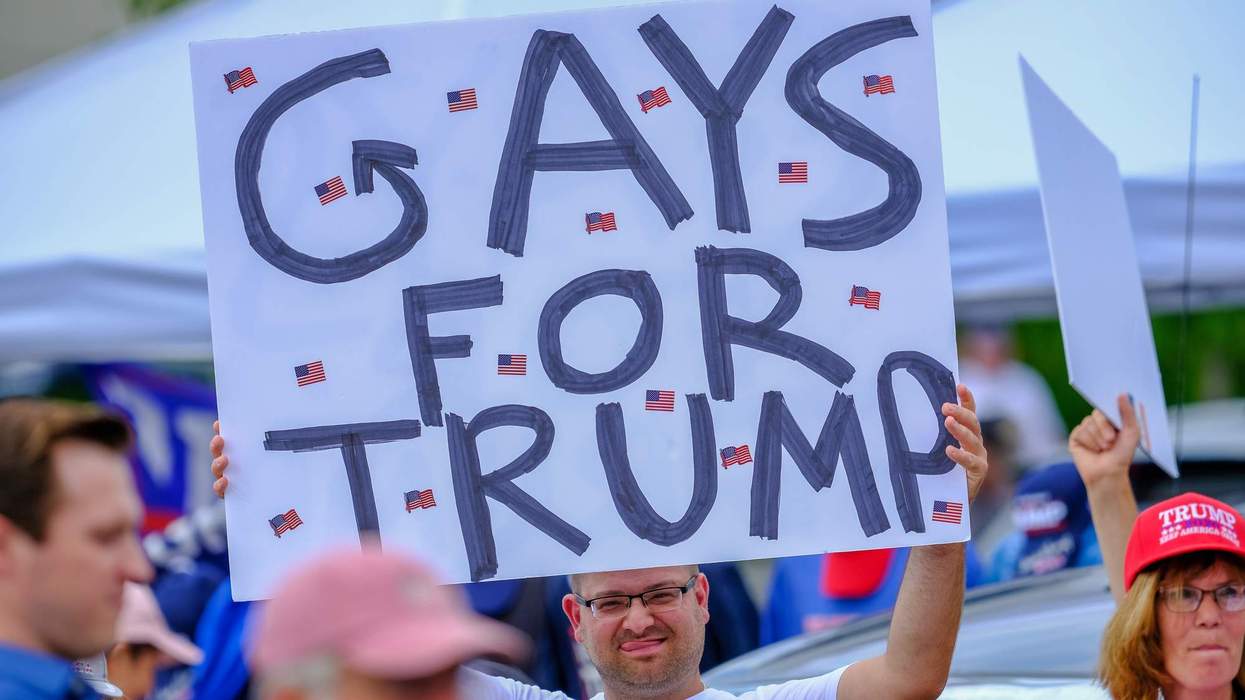When I first heard that Citi was sponsoring the Out100, I was thrilled. As a trans guy, I think it's very important when an advertiser takes an extra step to launch new features that meet my needs or release campaigns that feature a trans or nonbinary person, both of which Citi did. Because, until trans people are considered current or potential customers, I believe we won't have full equality in the public.
Excitingly, Citi is showing a real commitment to LGBTQ+ people by offering a real-world solution to something that can be very difficult for trans and nonbinary people: having the name they go by reflected on their credit card. It's something simple, and yet remarkable. Citi has become the first major bank in the U.S. to give eligible Citi branded credit card clients the option of requesting a new card displaying their chosen first name, without requiring a legal name change.
Here's why it's important to me.
Authenticity in Action
When you're trans or nonbinary you can become accustomed to barriers. You can become accustomed to others responding to your needs as though they are unreasonable, as though they are an imposition on everyone else. It is notable when a brand like Citi chooses to join us in spreading the message that our issues are not only understandable but also worth trying to solve.
Citi's new TV ad that celebrates the new card feature, in which a Black trans masculine person chooses a new name -- and sees it reflected on a new Citi card -- is heartwarming in part because how rare and authentic it is. The video not only normalizes this meaningful rite of passage that so many trans and nonbinary people experience, it also involves both a supportive partner and a parent in the name choosing process. The desire to have our chosen name on our credit card is presented as completely understandable and "normal."
When you're trans or nonbinary, everyday things most people take for granted can become minefields. That said, before I go further, I should be upfront: I am hugely privileged. I'm white and I pass as a cisgender man in-person. I still have a high voice and there's something feminine about me that some people do clock. But they rarely realize I'm trans, instead assuming I'm gay. Since I and my wife of 30 years are both queer-identified, that's never bothered us. But trans people of color, and those who are nonbinary or whose gender identity is perceived as being at odds with their presentation face much greater experiences of discrimination, hostility, and exclusion than I.
Changing Your Legal Name Isn't Always Easy
Changing your legal name often requires a court order. Going through that legal process costs money and takes time, so some trans people don't end up going that route. For many, we just adopt our chosen name and start using it. Some jurisdictions have adopted regulations to make this easier, and a number of nonprofit organizations can help trans or nonbinary people with the legal paperwork.
When I transitioned in 2005, I lived in California. I was able to change my name without a court order and change my gender marker on my driver's license prior to having bottom surgery, an important distinction given the expense involved and the fact that many people choose not to undergo gender confirmation surgeries or must wait many years to afford them. All I needed for the process was a form filled out by a psychiatrist certifying that I was living full time with my new name and gender.
That's not to say I haven't faced my own challenges. The first time my wife and I went on a cruise and needed passports I discovered that the federal government expected a court order and proof of bottom surgery before allowing me to update my passport. After a number of years of living with my new name and securing enough supplemental documentation, I was luckily able to change my name on my passport without a court order. But, for years afterward, my passport still listed the sex I was assigned at birth. (Due to the lack of consistency across the states, my birth certificate now lists my sex as male but still uses my original name.)
When I disembarked in other countries, I handed over a passport that listed my name as Jacob Anderson-Minshall but noted my sex as female. Any discrepancy on official identification has the potential to lead to delays and interrogation. While travelling, my anxiety would build while I stood in line and crescendo as the customs worker opened my passport, looked down, and looked back at me. I was fortunate that I was never called on the discrepancy. I am lucky that my physical appearance affords me the privilege of assumed maleness, which was never questioned by customs or airport security. Still, each time, I imagined what could happen if my luck ran out. That said, I didn't allow that fear to keep me home bound. And these days my passport reflects my chosen name and gender, and I have become the first trans editor in chief of Out Traveler.
A Card By Any Other Name
Historically, I've also had problems trying to prove I existed at all to companies which resulted in terrible credit over the years. 15 years ago, despite numerous letters with documentation attached, the three credit bureaus couldn't seem to figure out how to connect the present me with my past. Rather than just having to explain my name change when I applied for credit cards or apartment rentals, I found I couldn't prove I had any credit history at all. Jacob Anderson-Minshall seemed to have suddenly appeared out of thin air as a 38-year-old man. It was beyond suspicious.
I'm an out trans activist, so I didn't mind explaining, but that didn't always make a difference. Back then, even simply changing my name on an existing credit card was deemed impossible. Why? There wasn't a company willing to launch an initiative and interface to allow such changes.
Like the federal government, my bank had wanted a court order, a new passport or a birth certificate before changing the name on my account. That's why a moment like this, where Citi is helping people get cards with their chosen name, is actually revolutionary.
Potential customers must still apply for credit card accounts using the name on their legal documents, because financial institutions are required by law to collect and verify a customer's legal identity (and to report the application to credit bureaus). But there isn't a requirement that the name on the card match the holder's legal identification.
Ramifications of the Wrong Name
My experience isn't that unique -- according to the National Center for Transgender Equality, 70 percent of trans people go by a name that is different from the one on their legal identification. The years that it took me to get my federally-recognized documents altered translated into years of living with a credit card that didn't reflect my name. And as time wore on and my appearance masculinized, the discrepancy on my card became even more of a problem.
Anytime I tried to use my credit card in person, I was treated like I was using my wife's card or had lifted it from my mom's wallet. After the utter humiliation of having a card or identification rejected because of a perceived discrepancy between your gender presentation and the name in plastic, you start to avoid situations where it could happen again. And as a trans person, you are always aware of how simply trying to purchase food, pay for auto repairs, or board a plane can lead to a situation where humiliation is followed by something worse. Many in the transgender and nonbinary communities have faced similar difficulties, reporting negative experiences including being harassed, denied services, or attacked.
There are real-world ramifications to never having a credit card in your chosen first name. It's not just about preferences. It's not just the comfort of knowing everything in your wallet confirms who you authentically are. It's not just about being able to purchase the things you need. It's not just about avoiding some humiliating or dangerous interaction with a salesclerk. It's not just avoiding discrimination that might occur once the person serving you realizes you are trans. If you never have a credit card in your chosen first name then you stop using it. And that means that you stop building good credit. This has real ramifications. I'm not officially a co-owner of our house because adding me to the mortgage application would have decreased our chances of being approved.
These are just some of the reasons why what Citi launched is so important. This new feature, launched in conjunction with Mastercard, reflects a growing awareness of the needs of trans and nonbinary people. Citi is showing that it not only recognizes some of the issues that trans and nonbinary people confront every day, but it is offering us real world solutions. That's the sign of a corporate ally.
Video directed by Kelly Teacher for Out and Citi.














